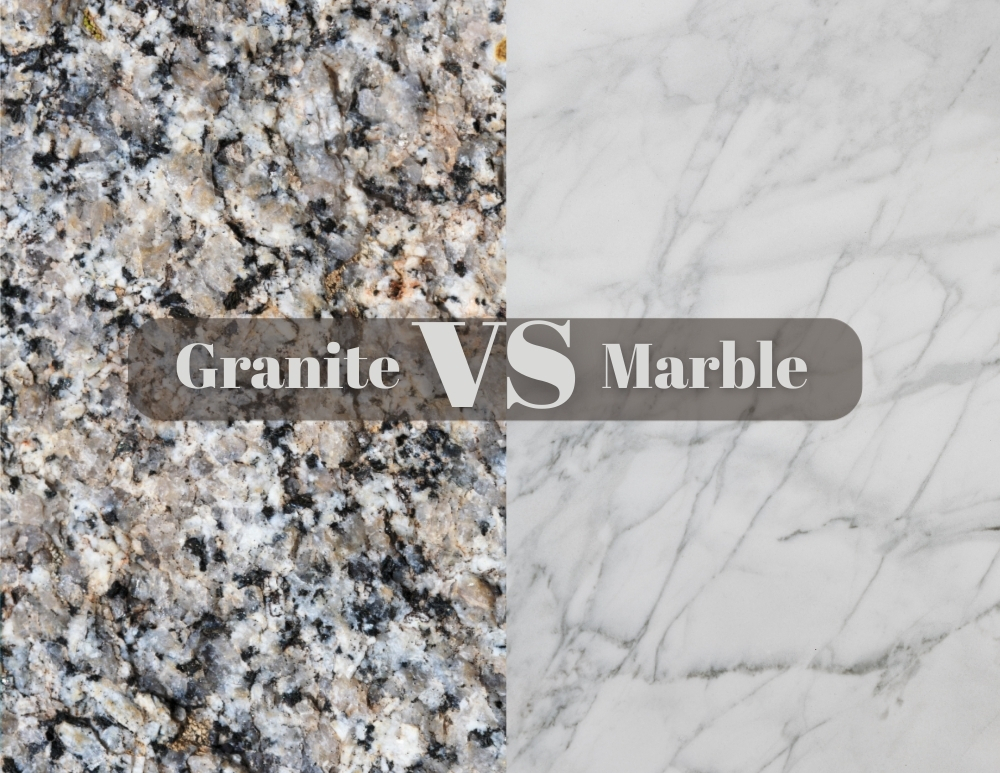When renovating your kitchen or bathroom, choosing between granite and quartz countertops can feel overwhelming. At first glance, they might look the same, but these materials differ significantly in composition, maintenance, and performance. Understanding these key differences will help you make the right decision for your home and lifestyle.
This comprehensive guide compares granite vs quartz countertops across every important factor, from durability and cost to maintenance and environmental impact, based on insights from industry experts.
Granite vs Quartz: Quick Comparison Summary
Composition
- Granite Countertops: 100% natural quarried stone
- Quartz Countertops: Crushed quartz + resins (up to 15% synthetic)
Appearance
- Granite Countertops: Unique, one-of-a-kind patterns
- Quartz Countertops: Uniform, engineered patterns
Cost
- Granite Countertops: $40-$100/sq ft installed
- Quartz Countertops: $50-$75/sq ft + $10-$30 installation
Maintenance
- Granite Countertops: Annual sealing required
- Quartz Countertops: No sealing needed
Heat Resistance
- Granite Countertops: Excellent – direct hot pan placement
- Quartz Countertops: Poor – can scorch from heat
Bacteria Resistance
- Granite Countertops: Good when properly sealed
- Quartz Countertops: Excellent – non-porous
Quick Answer: Choose granite if you love natural stone’s unique beauty and don’t mind annual maintenance. Choose quartz if you prioritize low maintenance and consistent appearance.
What Are Quartz Countertops? (Engineered Stone Explained)
Quartz countertops are synthetic stone products made from crushed quartz crystals combined with resins, pigments, and other synthetic materials. According to Meredith Barclay, The Home Depot’s Senior Merchant of Countertops, “This manufacturing process provides quartz countertops with advantages not found in natural stone.”
Composition and Manufacturing
Most quartz countertops contain 85-90% natural quartz minerals, with the remaining 10-15% consisting of polymer resins and color pigments. This engineered composition creates a uniform, non-porous surface that’s more consistent than natural stone.
Between 2015 and 2016, quartz gained massive popularity as improved manufacturing technology produced colors that convincingly mimic white marble with natural-looking veins, giving homeowners the elegant marble aesthetic without demanding maintenance requirements.
Quality Warning: Custom home builder Corbin Clay notes there’s been “a boom in quartz manufacturing over the last five years,” with an increase in low-quality quartz that’s “far less durable and prone to staining, chipping, and heat damage.” Always ask about manufacturer warranties when considering quartz.
What Are Granite Countertops? (Natural Stone Guide)
Granite countertops are slabs of quarried natural stone that come directly from the earth. Each slab offers a completely unique design that cannot be replicated, making granite a premium choice for homeowners who value natural beauty.
Unlike engineered materials, granite maintains its natural integrity throughout the entire fabrication process. The stone’s beauty is preserved during cutting and polishing, creating countertops with authentic geological patterns formed over millions of years.
Giant granite slabs are cut into uniform sizes using abrasive diamond wire or gang saws, with each slab requiring 6-7 hours of cutting time. This explains part of granite’s premium pricing, though each piece retains unique characteristics that make every installation one-of-a-kind.
Granite vs Quartz: Detailed Comparison
Durability and Strength
Both granite and quartz offer exceptional durability against daily wear and tear. Corbin Clay explains, “Both quartz and granite are extremely durable against scratches, heat, staining, and daily wear and tear. The choice between the two often comes down to personal preferences and the specific characteristics that matter most to the homeowner.”
Granite naturally hard and scratch-resistant with excellent impact resistance, though it may develop hairline cracks over time due to natural flaws. Quartz is engineered for consistent strength with excellent scratch resistance, but quality varies significantly between manufacturers.
Appearance and Design Options
The aesthetic choice between granite and quartz often reflects personal design philosophy.
Granite’s Natural Appeal offers unique patterns where every slab tells a geological story, with authentic beauty, dramatic veining, and timeless elegance. No two slabs are identical, creating truly custom installations.
Quartz’s Engineered Consistency provides uniform patterns with predictable, consistent appearance and exact color matching across projects. It offers unlimited design flexibility, mimicking marble, granite, or contemporary looks with minimal seaming in large installations.
The Authenticity Factor: Clay notes, “While the ‘natural’ veining in quartz colors available today are much more authentic-looking than years ago, a discerning eye may still see quartz as ‘fake-looking.'” Choose granite if natural authenticity is important to you.
Bacteria and Antimicrobial Properties
Winner: Quartz
Quartz takes the lead in bacteria resistance due to its engineered, non-porous surface. The material offers a non-porous surface with no spaces for bacteria to hide, natural antimicrobial properties, and many manufacturers add antibacterial additives for additional protection.
Granite has naturally antibacterial properties but faces porosity challenges that can harbor bacteria if not properly sealed. Regular sealing maintains bacteria resistance, but proper maintenance schedules are crucial.
Maintenance Requirements
Maintenance requirements represent one of the biggest differences between these materials.
Granite Maintenance:
- Annual resealing required every 12 months
- Immediate spill cleanup to prevent staining
- Use granite-specific or mild soap solutions
Quartz Maintenance:
- No sealing required ever
- Simple soap and water cleaning sufficient
- Non-porous surface resists most stains
- Built-in antibacterial protection
Bottom Line: If zero-maintenance is your priority, quartz is the clear winner.
Heat and Temperature Resistance
Heat resistance reveals a significant difference between these materials.
Granite offers superior heat performance with excellent resistance that can handle direct placement of hot cookware. It withstands extreme heat without damage and provides kitchen convenience without needing trivets in most situations.
Quartz is heat-sensitive due to resin content and risks heat damage that can scorch or discolor from hot items. The polymer content creates heat sensitivity, requiring trivet use and avoiding sudden temperature changes.
UV Considerations: Granite offers excellent UV stability for outdoor applications, while quartz can fade in direct sunlight, though some manufacturers offer UV-resistant options.
Cracking and Structural Integrity
Granite may have inherent flaws in natural stone that create hidden stress points, with installation stress potentially causing cracking and extreme temperature cycles causing issues.
Quartz features uniform composition with engineered consistency that reduces flaw-related cracking. Manufacturing quality provides controlled production that minimizes weak points, though it remains sensitive to temperature swings.
Cost Analysis: Complete Price Breakdown for 2025
Material Costs Comparison
Quartz Pricing:
- Standard range: $50-$75 per square foot
- Luxury options: Up to $200 per square foot for designer styles
- Installation: Additional $10-$30 per square foot
- Total installed cost: $60-$105 per square foot (standard)
Granite Pricing:
- Installed range: $40-$100 per square foot
- Style variations: Basic to exotic patterns affect pricing
- Edge treatments: Specialty edges increase costs
- Color rarity: Unique colors command premium prices
Factors Affecting Cost
Both materials are affected by overseas shipping costs, tariffs, and petroleum prices. Style complexity, color availability, slab thickness, and edge treatments all influence final pricing.
Money-Saving Tips: Consider stone remnants for smaller projects like bathroom vanities (30-60% savings), take last slabs to help suppliers clear inventory, and compare multiple fabricator quotes.
Environmental Impact & Safety
Composition and Environmental Considerations
Granite is 100% natural material with no synthetic components, is biodegradable, requires minimal processing, and has a chemical-free composition. However, quarrying operations affect local ecosystems and require significant transportation.
Quartz has mixed composition (85-90% natural quartz, 10-15% synthetic resins), contains non-biodegradable resins, requires energy-intensive manufacturing, but uses crushed quartz waste materials and reduces new quarrying requirements.
Safety: Radon Emissions Myth
The Environmental Protection Agency has addressed concerns about radon emissions from granite countertops. According to EPA findings, it’s “unlikely that radiation from granite countertops would increase annual radiation doses above normal, natural background levels.” Both granite and quartz pose negligible radon risk.
Pros and Cons Summary
Granite Countertops
Pros: Natural beauty with one-of-a-kind patterns, excellent heat resistance, extreme durability, increases home value, timeless appeal, wide variety of colors.
Cons: Requires annual sealing, needs immediate spill cleanup, potential for chipping from natural flaws, can harbor bacteria if improperly sealed, requires strong cabinet support.
Quartz Countertops
Pros: No sealing required, highly stain-resistant, excellent bacteria resistance, uniform appearance, unlimited color options, crack-resistant engineered consistency.
Cons: Heat-sensitive and can scorch, may look artificial, UV-sensitive and can fade, premium pricing, difficult to repair, contains non-biodegradable resins.
Expert Decision Framework
Choose Granite If:
- You value authenticity and want genuine natural stone character
- You love unique patterns and appreciate one-of-a-kind geological beauty
- You don’t mind annual maintenance and are willing to seal regularly
- You cook frequently and need superior heat resistance
- You prefer traditional looks and classic aesthetic appeals to you
Choose Quartz If:
- You prioritize convenience and want zero-maintenance countertops
- Health and hygiene are top priorities with superior bacteria resistance
- You prefer consistent appearance with uniform patterns and colors
- You want design flexibility and need specific colors or patterns
- You have a busy lifestyle and can’t maintain sealing schedules
Installation Considerations
Both granite and quartz require professional installation due to extreme weight (a 36-inch countertop weighs approximately 100 pounds), specialized cutting tools, and precision requirements. DIY installation risks injury and costly mistakes.
Both materials require identical installation timelines of 3-4 weeks from template to completion, including template creation (1-2 weeks), fabrication (1-2 weeks), and installation (1-2 days).
Frequently Asked Questions
Which is better, granite or quartz countertops?
Neither material is universally “better” – the choice depends on your priorities. Granite is better for those who want natural stone beauty and superior heat resistance, while quartz is better for low-maintenance households prioritizing stain and bacteria resistance.
Do quartz countertops stain?
High-quality quartz countertops are highly stain-resistant due to their non-porous surface, though they’re not completely stain-proof.
How often do granite countertops need to be sealed?
Granite countertops should be sealed annually, or approximately every 12 months.
Can you put hot pots on quartz countertops?
No, you should not place hot pots directly on quartz countertops. Always use trivets or hot pads to prevent heat damage.
Are quartz countertops antimicrobial?
Yes, quartz countertops are naturally antimicrobial due to their non-porous surface, and many manufacturers add antibacterial agents for additional protection.
Which adds more resale value to your home?
Both granite and quartz add significant resale value compared to laminate or tile options, with both considered premium upgrades.
The Bottom Line: Should You Choose Granite or Quartz?
Industry experts agree that both granite and quartz are excellent countertop materials that enhance kitchens and bathrooms while adding solid resale value to homes. The choice ultimately comes down to three key factors:
- Maintenance willingness: Can you commit to annual granite sealing?
- Aesthetic preference: Natural uniqueness vs engineered consistency?
- Usage patterns: Heavy cooking (granite) vs family-friendly convenience (quartz)?
Final Recommendation: There’s no wrong choice between high-quality granite and quartz – both materials will serve you well for decades. Focus on choosing the option that best matches your lifestyle, aesthetic preferences, and maintenance capabilities. Call us to chat to one of our experts!


